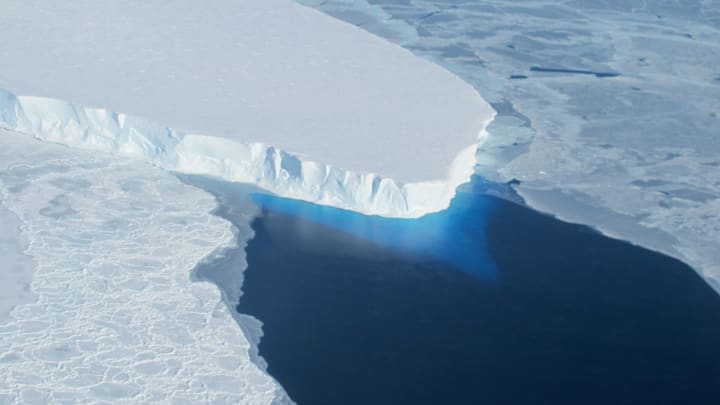Climate change gives us plenty to worry about, from air pollution to seafood contaminated with flesh-eating bacteria. Sea levels are also at the mercy of of our warming planet. In fact, years of research show that Antarctica’s Thwaites Glacier, a.k.a the “Doomsday Glacier,” will likely be gone by the 23rd century, drastically increasing water levels worldwide.
Scientists have been studying the ice mass since 2018 as part of the International Thwaites Glacier Collaboration (ITGC). They met at the British Antarctic Survey (BAS) in Cambridge, UK, in September 2024 to share their discoveries.
Dr. Rob Larter, British Antarctic Survey marine geophysicist and ITGC researcher, said in a statement, “Thwaites has been retreating for more than 80 years, accelerating considerably over the past 30 years, and our findings indicate it is set to retreat further and faster.” The scientists were able to determine this using technology such as underwater robots and predictive computer models.
Spanning 80 miles from edge to edge, Thwaites is the widest glacier on Earth, and its area is larger than England, Wales, and Northern Ireland. It is also over 6500 feet thick in some spots. If the gigantic ice river were to completely collapse, it would cause global sea levels to rise by 25 inches. This would be a major catastrophic event, hence the nickname “Doomsday Glacier.”
According to the ITGC, the shrinking body already contributes about 4 percent to global sea level rise. Higher sea levels means increased flooding, erosion, and the loss of homes in densely populated coastal areas.
”It’s concerning that the latest computer models predict continuing ice loss that will accelerate through the 22nd century and could lead to a widespread collapse of the West Antarctic Ice Sheet in the 23rd,” Dr. Ted Scambos, the ITGC’s U.S. science coordinator and a glaciologist at the University of Colorado, said in a statement. “Immediate and sustained climate intervention will have a positive effect, but a delayed one, particularly in moderating the delivery of warm deep ocean water that is the main driver of retreat.”
Read More About Climate Change:
